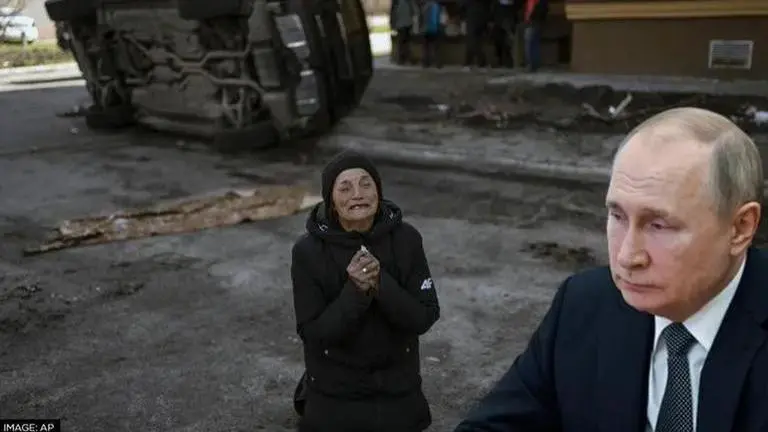Updated 14 April 2022 at 16:29 IST
Explained: What is the difference between genocide, crimes against humanity & war crimes?
According to the UN, crimes against humanity have not yet been codified in a dedicated treaty of international law, unlike genocide and war crimes. Know more.
- World News
- 4 min read

After the bodies of at least 410 civilians were recovered from towns around Ukraine's capital, Kyiv, after the areas were recaptured by Ukrainian forces from Russian troops, a demand to prosecute Russian President Vladimir Putin and top Kremlin leaders has been raised by several world leaders.
Though the word "war crimes" has been widely used by politicians, US President Joe Biden created turmoil on Wednesday after using the word "genocide" to describe Russia's actions against Ukrainians.
"Yes, I called it genocide," the US president told reporters in Iowa before boarding Air Force One to return to Washington. "It’s become clearer and clearer," he added.
Though Biden, while addressing spiking energy prices caused by the war, had implied that he thought Putin was carrying out genocide against Ukraine, he offered no details. The words, "war crime", "genocide", and "crimes against humanity" hold significance in their own ways. Continue reading to know what they mean and how they're different.
Advertisement
What is genocide?
Genocide was first recognised as a crime under international law in 1946 by the United Nations General Assembly. It was codified as an independent crime in the 1948 Convention on the Prevention and Punishment of the Crime of Genocide (the Genocide Convention). According to the definition proposed by the United Nations, genocide means any of the following acts committed with the intent to destroy, in whole or in part, a national, ethnical, racial or religious group, as such:
- Killing members of the group;
- Causing serious bodily or mental harm to members of the group;
- Deliberately inflicting on the group conditions of life calculated to bring about its physical destruction in whole or in part;
- Imposing measures intended to prevent births within the group;
- Forcibly transferring children of the group to another group.
What are war crimes?
According to the United Nations, any "grave breaches" of the Geneva Conventions - a set of humanitarian laws, will fall under war crime. As per the Geneva Convention, any of the following acts against persons or property protected under the provisions of the Geneva Convention amount to a war crime:
Advertisement
- Wilful killing
- Torture or inhuman treatment, including biological experiments
- Wilfully causing great suffering or serious injury to body or health
- Extensive destruction and appropriation of property, not justified by military necessity and carried out unlawfully and wantonly
- Compelling a prisoner of war or other protected person to serve in the forces of a hostile Power
- Wilfully depriving a prisoner of war or other protected person of the rights to a fair and regular trial
- Unlawful deportation or transfer or unlawful confinement
- Taking of hostages
What are crimes against humanity?
According to the UN, crimes against humanity have not yet been codified in a dedicated treaty of international law, unlike genocide and war crimes. It said that the crime against humanity means any of the following acts when committed as part of a widespread or systematic attack directed against any civilian population, with knowledge of the attack:
- Murder;
- Extermination;
- Enslavement;
- Deportation or forcible transfer of population;
- Imprisonment or other severe deprivation of physical liberty in violation of fundamental rules of international law;
- Torture;
- Rape, sexual slavery, enforced prostitution, forced pregnancy, enforced sterilization, or any other form of sexual violence.
What is ICJ and what are the sources of evidence?
The International Court of Justice, or the World Court, is one of the six principal organs of the United Nations that settles disputes between states per international law and provides advisory on international legal issues. Meanwhile, US national security advisor, Jake Sullivan, while addressing a press conference, said that the US has credible reports of torture, rape and execution of civilians. According to him, the main sources of evidence are:
- Information gathered by the US and its allies
- Evidence from international organisations including the United Nations and NGOs
- Evidence collected by the Ukrainian government and various investigating agencies working on the ground
- Evidence such as photographs and videos documented by media organisations
Is it possible to prosecute Russian President Putin for his brutality in Ukraine?
While speaking to the Associated Press, Philippe Sands, professor at University College, London, said that it is very difficult to prosecute the Russian President and his close allies for war crimes or genocide. According to Sands, it is hard to prove that Putin and his inner circle committed war crimes even though more than 400 bodies were found in Bucha.
"There’s a real risk you end up with trials of mid-level people in three years and the main people responsible for this horror – Putin, Lavrov, the minister of defence, the intelligence folks, the military folks and the financiers who are supporting it – will get off the hook," he told AP.
(Image: AP)
Published By : Ajeet Kumar
Published On: 14 April 2022 at 16:29 IST
